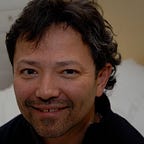Deleuzian Liberalism 3
The Physiology of Pure Difference
The Plane of Public Immanence
The liberal state as a plane of public immanence, as an overall deterritorialization, is normative, valuable and worthy of defending from our perspective: as actualizations of the virtual, capable of practical thought without an image.
The liberal state is not neutrality, it is a force of becoming, subject only to the norm of the eternal return of difference.
Other visions of society that would undermine becoming and process, deny life, say no to life, are necessarily representational, transcendent poles smothering life, and thus reprehensible.
Patton and Critical Freedom
Earlier, we discussed Patton’s incorporation of critical freedom into Deleuze’s sense of becoming.
Critical freedom is the ability to critically evaluate values and revise or transform one’s conception of the good.
The liberal state is a form of political organization that contemplates this possibility of becoming, of participating in pure difference to create new ways of life, of releasing identity and embracing difference.
Liberal Pluralism Affirms Pure Difference
Liberal pluralism is a form of political organization that embraces the freedom to create life and affirm difference.
Freedom in a process of becoming is the norm of a Deleuzian liberal vision.
In relation to social and political formations, the overriding question that we must address is whether their ordering provides for maximum creativity and experimentation, an opening up to the new.
The just society is not an end in itself, it is a means of facilitating the affirmation of life; it is itself a becoming.
The Liberal State as a Becoming
The liberal state need not be centralized. Other forms of political organization could reflect a Deleuzian philosophy.
Likewise, nothing in Rawls suggest political institutions must be organized the way they are, via centralized executive, legislative and judicial bodies. A decentralized politic is consistent with liberal thought, and is but one form into which a Deleuzian liberalism could evolve.
Rhizomatic politics infused with practical public reason that affirms life is but one possible social formation that is envisioned in Deleuze’s thought.
Indeed, the centralized nature of the ordering of our political and social institutions is characteristic of the tendency for the liberal state to stagnate and crystallize; abstractions and striations arise in the context of centralization.
Rawls and Deleuze would both defend the same vision here: one of flows, not prolonged territorialization.
The Liberal State in Evolution
Different assemblages evolve over time. Nomads in society are continually at work forcing change. Differing machinic connectivities form and dissolve. Overall, a liberal democracy and a politics of pluralism that supports such transformations works within with a philosophy of difference.
The Deleuzian liberal state is a deterritorializing force to counter striations of power that emerge: organic culture, populism, state capitalism; singularities of power that oppress. It is the counter to the transcendent micro fascism that plants itself in liberalism and grows; a counter to a comprehensive vision that would dictate how we should live our lives.
Deleuzian liberalism keeps us at the level of the problem: harks back to the overriding question of how we might live fulfilling lives, and provides the space to create in relation thereto; never dictates how we should live our lives.
The Physiology of Pure Difference
Nomads are the riders along the frontiers of liberal pluralism, breaking down striations of micro and macro fascism; micro fascist ethics, and global fascist state capitalism; breaking down our fascination with wealth and power and allowing us to see life again, pure and simple, as flows, lines of flight, possibility and opportunity for the creation of the striking and original.
The war machine has its sights on that which would exercise control over the pluralist society, stagnate its dynamism; not that which would promote the creation of the new.
Rawls, and liberal theory in general, can be seen from the relatively static perspective of structure: the anatomy of the liberal state, the bare bones skeleton that can reshape itself.
But more remarkably, the liberal state can be viewed as an anatomy infused with the Deleuzian physiology of a philosophy of difference; one which creates new freeways for interconnectivity.
Deleuzian blood flows through the arteries of liberalism.
The liberal state is not an end in itself, for at the limit, the skeleton falls away. The liberal state at the limit becomes one in which the principles and terms fall away.
The liberal state becomes the one and the many: pluralism and tolerance as integral to a process of becoming.
I hope you enjoyed this article. Thanks for reading!
Tomas
Please join my email list here or email me at tomas@tomasbyrne.com.
Excerpt from my forthcoming book, Becoming: A Life of Pure Difference (Gilles Deleuze and the Philosophy of the New) Copyright © 2021 by Tomas Byrne. Learn more here.
